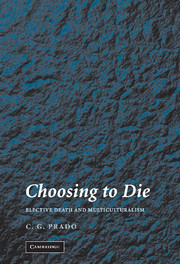Book contents
- Frontmatter
- Contents
- Preface
- 1 Setting the Stage
- 2 Criteria for Rational Suicide
- 3 Clarifying and Revising the Criteria
- 4 Application Issues
- 5 What Standards?
- 6 Relativism and Cross-Cultural Assessment
- 7 The Role of Religion
- 8 Assessment Latitude
- 9 The Realities of Cross-Cultural Assessment
- Works Cited
- Index
9 - The Realities of Cross-Cultural Assessment
Published online by Cambridge University Press: 05 June 2012
- Frontmatter
- Contents
- Preface
- 1 Setting the Stage
- 2 Criteria for Rational Suicide
- 3 Clarifying and Revising the Criteria
- 4 Application Issues
- 5 What Standards?
- 6 Relativism and Cross-Cultural Assessment
- 7 The Role of Religion
- 8 Assessment Latitude
- 9 The Realities of Cross-Cultural Assessment
- Works Cited
- Index
Summary
In the last chapter we considered the need for allowance of latitude in applying the rationality criterion's clauses in order to deal with the realities of actual cases. We now have to consider another aspect of the realities of actual cases: an aspect that is in some ways even more difficult to deal with than limitations on the soundness of individuals' reasoning and issues with their motives. What we have to consider here essentially is an unanticipated effect of multiculturalism, one that complicates fulfillment of the rationality criterion's requirement that elective-death reasoning and motivation be cross-culturally assessed for soundness and acceptability.
The problem arises from the very fact that multicultural societies are precisely that: multicultural. This fact poses difficulties with identifying the values that have the greatest determining influences on individuals' perceptions and judgments regarding elective-death deliberations. As will emerge, identification of fundamental values that elective-death assessors actually hold has been complicated by how multiculturalism's pluralities have made elusive the values individual members of traditional cultures can be expected to hold. Multiculturalism has produced this elusiveness by fostering a proliferation of the sets of values that characterize cohesive social groups.
In too many cases, identifying assessors as, say, European Christians or Asian Buddhists no longer suffices to provide any surety that the individuals so identified hold the values that define those particular cultures.
- Type
- Chapter
- Information
- Choosing to DieElective Death and Multiculturalism, pp. 179 - 204Publisher: Cambridge University PressPrint publication year: 2008



